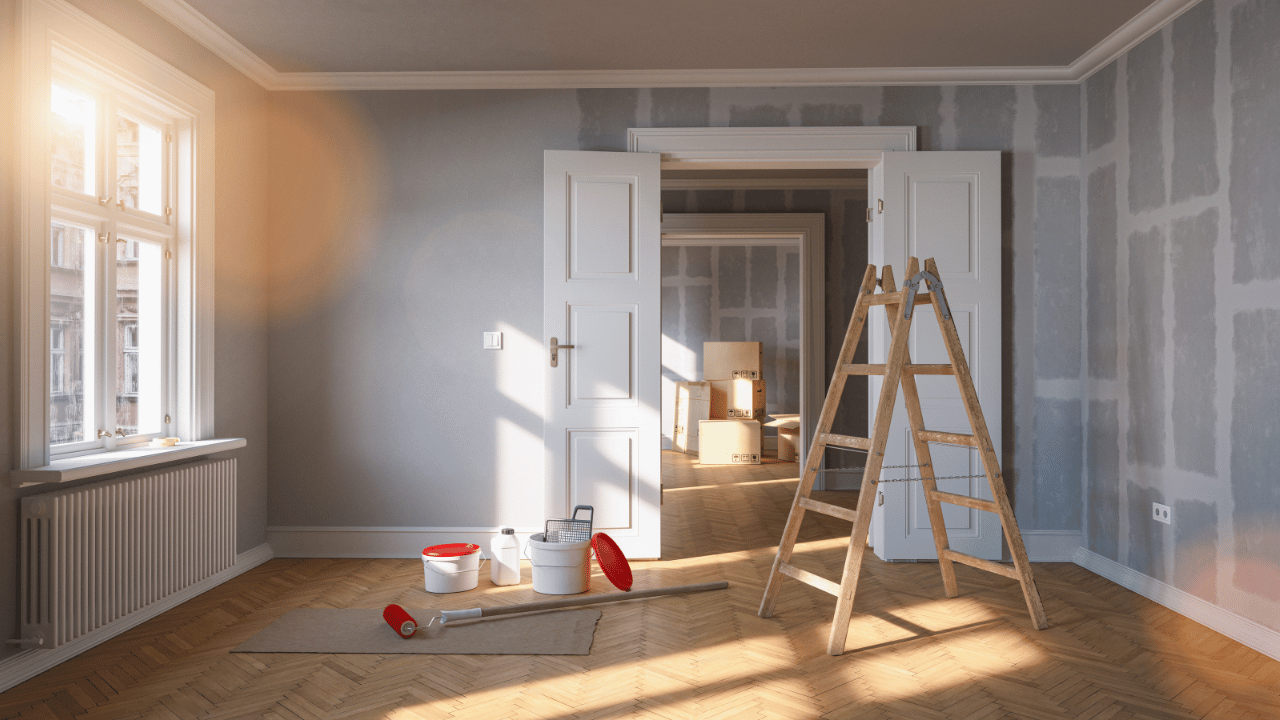Last Updated on October 21, 2023 by Pro Handyman Australia – Editorial Team
Embarking on a house renovation often evokes images of a dream home taking shape, of fresh walls and redesigned spaces. But beyond the layers of paint and new fixtures, there’s an emotional landscape that homeowners traverse, one that isn’t discussed as often. While the process can be rewarding, it can also bring unforeseen stress and, for some, a shadow of depression. The intertwining of personal space with chaos, financial pressures, and decision fatigue can sometimes culminate in feelings of overwhelm. This blog delves deep into understanding the emotional roller-coaster of renovating, shedding light on why depression can surface, and offering guidance on navigating these murky waters.
Can Home Renovations Lead to Depression?
Renovating one’s home is often envisioned as a fresh start, an exciting venture into redesigning and restructuring. While the end goal is usually a rejuvenated living space, the journey isn’t always as glamorous. Beyond the decisions, dust, and dollars, there’s a psychological component to home renovations that isn’t frequently discussed.
Understanding the Stress of Home Renovations

The Nature of Renovations
Home renovations, while promising rejuvenation and a fresh look, can be a daunting task. One of the primary reasons they become a source of stress is their time-consuming nature. Completing a renovation often takes longer than expected, especially when unforeseen challenges arise.
Financial Implications
Another significant factor is the financial burden. Renovations can be expensive, and budgets can easily be stretched with unexpected costs or design changes. Managing these expenses and ensuring you’re getting value for your money can add to the pressure.
Unpredictable Outcomes
The unpredictability associated with renovations is another stressor. Sometimes, what seemed like a simple task can morph into a complex issue, requiring more time, resources, and decision-making.
Disruption of Daily Life
Renovations inevitably lead to disruptions in daily routines. Whether it’s the constant noise of construction, areas of your home being off-limits, or the mere fact that your once-familiar space is changing, these disruptions can be disconcerting.
Continuous Influx of People and Materials
With home renovations, there’s a continuous flow of contractors, deliveries, and sometimes, unforeseen debris. Managing these while maintaining your daily life can be challenging. Having various professionals coming in and out of your space might feel invasive and add to the overall stress.
Emotional Dynamics
The combination of all these factors can undoubtedly bring about heightened emotions. It’s natural for the challenges and disruptions of a renovation to evoke strong feelings and stress. Being prepared for this emotional rollercoaster and finding ways to manage it is crucial for a smoother renovation experience.
The Emotional Landscape of Home Makeovers

Home renovation: a term that conjures visions of fresh paint, gleaming fixtures, and dream spaces coming to life. For many, it’s the manifestation of personal aspirations, a reflection of growth, and an embodiment of change. However, beneath the exhilarating anticipation of a revamped home, there lies a lesser-discussed emotional dimension. Surprisingly to some, renovation projects can be a hotbed for stress and even depression. But why does something so promising become a source of emotional strain? Let’s delve into the reasons.
1. Loss of Familiarity
Our homes are more than just bricks and mortar; they are repositories of memories, experiences, and a sense of belonging. When walls are torn down or rooms are altered, it can sometimes feel like erasing chapters of one’s life, leading to feelings of loss or nostalgia.
2. Decision Fatigue
From choosing paint colors to selecting fixtures, every decision in a renovation project holds weight. With countless choices to make, many homeowners experience decision fatigue, which can be mentally exhausting and lead to feelings of helplessness or regret.
This is a real psychological condition where the quality of decisions deteriorates after making many decisions in a short period. In the context of home renovations, this could range from choosing paint shades to deciding on the type of knobs for your cabinets. The continuous process can be exhausting and overwhelming.
3. Financial Strain

No matter how well budgeted a renovation is, unexpected costs can crop up. The mounting bills and unforeseen expenses can cause significant financial stress, a well-known trigger for depressive feelings.
4. Physical Disarray
Living amidst clutter, dust, and the cacophony of construction can be unsettling. The lack of order, routine, and cleanliness often causes anxiety and a feeling of life being in limbo.
5. Unmet Expectations
Sometimes, the vision one has doesn’t align with the reality of the renovation. When expectations aren’t met, be it due to miscommunication with contractors or unforeseen structural issues, it can lead to disappointment and sadness.
6. Interpersonal Stress
Renovations can strain relationships. Differences in design preferences, spending habits, or even the general approach to handling the renovation can cause disagreements. Such tensions can contribute to a strained emotional environment.
7. Fear of Change
Humans are creatures of habit. While change can be exciting, it also brings uncertainty. Renovating a home, especially if it’s a long-term residence, can stir up anxieties about the future and what these changes signify.
8. Project Delays
Few things are as frustrating as unforeseen delays. Whether due to materials not arriving on time, contractors falling behind schedule, or unexpected structural challenges, delays can prolong the emotional and physical discomfort of renovations.
9. Sense of Invasion
Having contractors and workers in one’s personal space daily can feel invasive. The constant presence of outsiders can disrupt the sanctuary-like feel of a home, leading to feelings of vulnerability or discomfort.
10. Loss of Control
Amidst the whirlwind of activities, homeowners can sometimes feel they’re losing control. This can be especially true when relying on external parties for key aspects of the project, leading to feelings of unease and uncertainty.
11. The Excitement and the Overwhelm
Embarking on a home renovation project can be thrilling at first. The idea of choosing new colors, fixtures, and fittings; the thought of experiencing a brand new living space — it’s all quite exhilarating. However, this initial excitement can soon be overshadowed by the sheer volume of decisions to make, leading to decision fatigue.
12. Displacement and Discomfort
Depending on the scale of your renovation, parts (or all) of your home may be inaccessible for extended periods. Living in a construction zone, dealing with dust, noise, and lack of privacy can disturb daily routines and cause significant discomfort. This displacement from one’s comfort zone can lead to feelings of distress and sadness.
13. Unmet Expectations
We’ve all been there — envisioning a particular design, only for the reality to fall short. Contractors might make mistakes, or the final look might not match up with what was in mind. Coping with these unmet expectations can result in feelings of disappointment, leading to emotional distress.
14. The Link to Seasonal Affective Disorder (SAD)
If renovations are occurring during fall or winter, homeowners may already be susceptible to Seasonal Affective Disorder (SAD), a type of depression that comes and goes with the seasons. The added stress of renovations can exacerbate the symptoms.
Coping with Depression During Home Renovation: Finding Calm Amidst the Chaos

Home renovations are exciting prospects. They promise a renewed living space, a fresh start, and often an enhanced lifestyle. However, amidst the dust, noise, and decision-making, it’s not uncommon for homeowners to experience feelings of overwhelm, stress, and even depression. With the home being a sanctuary for many, its disruption can cause emotional turbulence. But fret not. Here are some strategies to help you navigate these feelings and find calm amidst the renovation chaos.
1. Set Realistic Expectations
Before starting the renovation, clarify your goals and set realistic expectations. Understanding that there will be unforeseen challenges can prepare you mentally and emotionally for the journey ahead.
2. Establish a Safe Haven
Designate a part of your home as a ‘no-renovation’ zone. This can be a bedroom or a cozy corner where you can retreat, relax, and recharge away from the chaos.
3. Stay Organized
A well-laid plan can reduce feelings of being overwhelmed. Create a timeline, maintain a checklist, and keep all renovation-related documents in one place. The more organized you are, the more in control you’ll feel.
4. Take Regular Breaks
Give yourself permission to step away. Whether it’s a weekend getaway or just a day out, taking breaks can offer a refreshing change of scenery and perspective.
5. Communicate Openly
Keep an open line of communication with your contractors. Regular updates will prevent surprises and reduce anxiety. Similarly, talk to family members about your feelings. Sometimes, just verbalizing what you feel can be therapeutic.

6. Engage in Stress-Relieving Activities
Now’s the perfect time to indulge in activities that help reduce stress. Whether it’s yoga, meditation, reading, or even just a walk in the park, find what calms your soul and make time for it.
7. Seek Professional Help
If feelings of sadness or depression persist, consider consulting a mental health professional. Sometimes, external guidance can offer clarity and coping strategies.
8. Stay Connected with Loved Ones
Isolation can intensify feelings of depression. Engage with friends, attend social events, or even join online communities where others share their renovation experiences. It can be comforting to know you’re not alone.
9. Celebrate Small Wins
Every step forward, no matter how minor, is progress. Celebrate the little milestones, like the completion of a room or the arrival of materials. Focusing on the positives can be uplifting.
10. Visualize the End Result
Whenever you feel overwhelmed, close your eyes and imagine your renovated home. Visualizing the end result can serve as a motivational boost and a reminder of why you embarked on this journey.
11. Maintain a Healthy Lifestyle
Physical health often impacts emotional well-being. Ensure you’re eating balanced meals, getting sufficient sleep, and engaging in regular physical activity. This not only keeps you in good health but also equips you better to handle stress.
Additional Coping Mechanism that Homeowners Can Do:
While the above points might paint a daunting picture, it’s essential to know that these feelings are valid and not uncommon. Here are some additional coping mechanisms:
- Open Communication: Regularly communicate with your contractor to ensure that you’re on the same page.
- Self-care: Carve out ‘me-time’, ensuring you get breaks from the renovation chaos.
- Seek Professional Help: If feelings of sadness persist, consider consulting with a therapist or counselor.
Strategies to Maintain Well-being During Home Renovations

The Importance of Scheduled Breaks
Consistently integrating breaks into your workdays is crucial. Think of it this way: labor unions emphasize regular intervals for rest, so why shouldn’t homeowners and DIY enthusiasts? Avoid the trap of continually pushing through. For instance, if you aim to finish the flooring before lunch, don’t get sidetracked by minor imperfections that can lead to prolonged work hours. The result? Hunger, fatigue, frustration, and mounting stress. To rejuvenate both your body and mind, stick to your planned break times.
The Value of Taking a Day Off
Renovating a house demands immense dedication and energy. If you’re overseeing a renovation while managing daily responsibilities or a full-time job, you’re undoubtedly juggling multiple roles. Though you might be tempted to capitalize on weekends for more renovation work, it’s essential to occasionally switch gears. Give yourself credit for the hard work and remember that everyone deserves a respite. Whether it’s enjoying a leisurely lunch, visiting a zoo, attending a social event, or just unwinding, stepping away momentarily can be incredibly revitalizing. This brief hiatus can help you return to your project with renewed vigor and clarity.
Setting Clear Deadlines
While enthusiasm at the start of a project is high, there’s a risk of dwindling momentum, especially for non-essential spaces like secondary bathrooms or guest rooms. This protracted approach can add to feelings of discontent and stress. For instance, an unfinished room becomes a visual reminder of lingering tasks. Over time, living with unfinished spaces can lead to familial tension and dissatisfaction with one’s living conditions. To navigate these potential pitfalls, set clear and achievable deadlines for every stage of the project. This not only ensures timely completion but also provides a sense of accomplishment and purpose.
Embracing Flexibility in Deadlines
Sometimes the weight of missing a deadline can overshadow the original purpose of having one. Should unexpected delays occur, especially before significant occasions like a family visit or the holidays, exercise self-compassion and adjust your expectations. If certain aspects aren’t ready in time, remember that life will continue. Missing a renovation deadline isn’t the end of the world.
Visualization as a Motivational Tool
For many, envisioning the end result of a renovation acts as a beacon of hope during challenging times. While it’s natural to feel eager to conclude a project, patience is key, especially when waiting for paint to dry or settling details. Combat any rising impatience by immersing yourself in the dream of the finished space. Use this time to explore additional elements, like decor and furnishings, to further enhance your envisioned space.

Anticipating Challenges
Approaching a renovation with the illusion that everything will proceed flawlessly is setting oneself up for disappointment. Instead, recognize that houses, especially older ones, come with their own set of unique challenges. Anticipate encountering unexpected issues during the process. For example, you might discover hidden damage that’s been growing unnoticed for years. By mentally preparing for unforeseen setbacks, you’ll be better equipped to handle them when they arise.
Limiting Social Media Exposure
While it’s human nature to compare ourselves with others, witnessing another’s completed project while you’re amidst chaos can be disheartening. It’s crucial to remember that social media often portrays an idealized version of reality. For your well-being, consider reducing or even pausing your social media consumption during intense renovation phases. This break can help realign your focus and potentially improve your mental health.
Choosing the Right Contractor
Selecting the right contractor can be daunting, given the complexities of estimates, financial commitments, and working with new individuals. Alleviate some of this anxiety by seeking contractors through trusted recommendations. As you vet potential candidates, research their online presence, consult their previous clients, and check their standing with regulatory bodies. Above all, trust your instincts. If a contractor doesn’t seem like a good fit, they likely aren’t. Conversely, if you feel a sense of trust and reliability from them, it’s a promising sign.
Prioritize Open Communication
Clear and open dialogue, whether with your work crew, family members, or partner, can significantly reduce stress and depressive feelings during home renovations. It’s essential to maintain this line of communication, even with younger family members. For instance, engaging your children in discussions about the ongoing renovations can foster understanding and shared excitement. If you sense growing tension with your partner or spouse, address it promptly through open conversations.
Revisit Your Purpose
Amidst the chaos of extensive renovations, it’s crucial to pause and recall the initial reasons for undertaking the project. Maybe you’re revamping a bathroom to ensure your elderly mother can access facilities with ease, or perhaps you’re keen on wrapping up a rental apartment project before a new family addition. Personally, picturing the joy on a child’s face, as they explore their newly renovated room, can be a beacon of hope on taxing days. Such visualization techniques can be instrumental in keeping your spirits high.
Financial Prudence is Key
It’s no secret that renovations can be financially draining. To alleviate the dual stress of renovations and financial constraints, meticulous budgeting is indispensable. While drafting a budget, consider incorporating an additional 10-15% contingency. This buffer ensures that unexpected costs don’t halt your project or lead to financial distress.
Maintain a Safe Haven
Living in a home that’s simultaneously being renovated can be overwhelming. Designate an area in your home that remains untouched by the upheaval—a zone free from dust, tools, and boxes. This sanctuary can act as an essential respite from the chaos, serving as a daily reminder of normalcy and aiding in staving off feelings of depression.
Uphold Your Regular Routines
Routine has a comforting regularity, providing a semblance of normalcy during disruptions. Whether it’s ensuring your children continue attending their day care or summer camps, or sticking to your weekly fitness classes, maintaining these routines is crucial. Engaging in activities that foster a sense of well-being—be it a religious commitment or social gatherings with friends—can be the stability you need during home renovations.
Conclusion
Experiencing emotional highs and lows during a home renovation is natural. The key is to recognize these feelings, address them head-on, and employ strategies to cope. With a proactive approach, you can ensure that by the time the last coat of paint dries, you’re not only left with a beautiful home but also a sense of accomplishment and well-being. Remember, every challenge faced during this journey adds a unique story to the walls of your revamped space, making it even more special.
